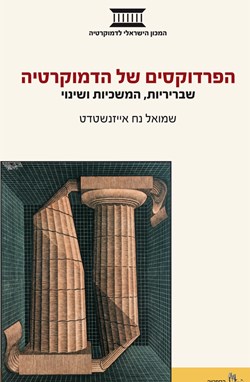Paradoxes of Democracy: Fragility, Continuity, and Change
- Written By: Shmuel Noah Eisenstadt
- Translation: Ruthi Bar-Ilan
- Publication Date:
- Cover Type: Hardcover | Hebrew
- Number Of Pages: 210 Pages
- Price: 70 NIS
A volume that discusses the origins of democratic theory, focusing on the numerous paradoxes, the resulting tensions and antinomies, and the major factors affecting the potential of democratic regimes to tolerate protest and social movements in their midst.
Democratic discourse has long been guided by two contradictory premises. The first proclaimed the natural human tendency towards democracy, even as the other emphasized the fragility of constitutional democracy. What are the main reasons for the inherent fragility of constitutional democracies? What factors allow them to survive and endure, despite this fragility? These questions are at the center of the present discussion.
After presenting the different concepts of democracy [especially the two basic types—the constitutional on the one hand and the varieties of the participational (republican and communitarian), on the other], the author, Professor Shmuel Noah Eisenstadt, situates the roots of democratic theory in the cultural and political program of the modern age, analyzes the variety of contradictions, tensions, and antimonies that grew from these roots, and cites some of their historical occurrences in the political sphere. Next, he pays special attention to the main conditions that influence democratic regimes’ potential to incorporate protesters and social movements, thereby insuring the coexistence of the regime and the protest movements.
The author concludes his work with the new trends that threaten the stability of democracies in contemporary societies. The Hebrew edition includes an appendix on the vagaries of democracy in Israel, from the establishment of the Zionist institutions of the New Yishuv through today.
About the Author
Professor Shmuel Noah Eisenstadt is considered the father of Israeli sociology. He is an Israel Prize laureate and was a fellow of the Van Leer Jerusalem Institute. His book Fundamentalism, published by Cambridge University Press, won the European Amalfi prize in 2000 and was named a modern classic of sociology.
- Tags:
- democracy,
- ideology

